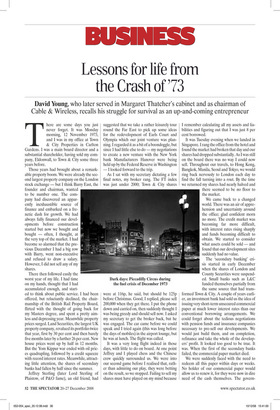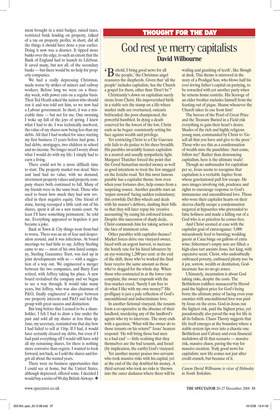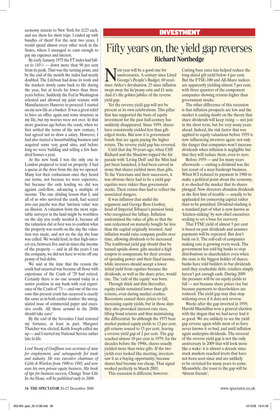Lessons for life from the Crash of ’73
David Young, who later served in Margaret Thatcher’s cabinet and as chairman of Cable & Wireless, recalls his struggle for survival as an up-and-coming entrepreneur There are some days you just never forget. It was Monday morning, 12 November 1973, and I was in my office at Town & City Properties in Carlton Gardens. I was a main board director and a substantial shareholder, having sold my company, Eldonwall, to Town & City some three years before.
Those years had brought about a remarkable property boom. We were already the second largest property company on the London stock exchange — but I think Barry East, the founder and chairman, wanted to be number one. The company had discovered an apparently inexhaustible source of finance and embarked on a frenetic dash for growth. We had always fully financed our developments before construction started but now we bought and bought — often, I thought, at the very top of the market. I had become so alarmed that the previous December I had a big row with Barry, went non-executive and refused to draw a salary. However, I did not sell any of my shares.
There then followed easily the worst year of my life. I had time on my hands, thought that I had accumulated enough, and started to think about public service. I had been offered, but reluctantly declined, the chairmanship of the British Rail Property Board, flirted with the thought of going back for my Masters degree, and spent a pretty aimless and depressing year. Meanwhile property prices surged. Land Securities, the largest UK property company, revalued its portfolio twice that year, first by 30 per cent and then barely five months later by a further 26 per cent. New house prices went up by half in 12 months. But the Yom Kippur war ended with oil prices quadrupling, followed by a credit squeeze with record interest rates. Meanwhile, attracting little attention, the shares of secondary banks had fallen by half since the summer.
Jeffrey Sterling (later Lord Sterling of Plaistow, of P&O fame), an old friend, had suggested that we take a rather leisurely tour round the Far East to pick up some ideas for the redevelopment of Earls Court and Olympia which our joint venture was planning. I regarded it as a bit of a boondoggle, but since I had little else to do — my negotiations to create a new venture with the New York bank Manufacturers Hanover were being held up by the Federal Reserve in Washington — I looked forward to the trip.
As I sat with my secretary dictating a few final notes, my broker rang. The FT index was just under 2000; Town & City shares were at 116p, he said, but should be 125p before Christmas. Good, I replied, please sell 200,000 when they get there. I put the phone down and carried on, then suddenly thought I was being greedy and should sell now. I asked my secretary to get the broker back, but he was engaged. The car came before we could speak and I tried again (this was long before the days of mobiles) in the airport lounge, but he was at lunch. The flight was called.
It was a very long flight indeed in those days, with little to do on board. At one point Jeffrey and I played chess and the Chinese crew quickly surrounded us. We were into our second game before I realised that, rather than admiring our play, they were betting on the result, so we stopped. Failing to sell my shares must have played on my mind because I remember calculating all my assets and liabilities and figuring out that I was just 8 per cent borrowed.
It was Tuesday evening when we landed in Singapore. I rang the office from the hotel and found the market had broken that day and our shares had dropped substantially. As I was still on the board there was no way I could now sell. Throughout our travels, to Hong Kong, Bangkok, Manila, Seoul and Tokyo, we would ring back nervously to London each day to find the fall turning into a rout. By the time we returned my shares had nearly halved and there seemed to be no floor to the market.
We came back to a changed world. There was an air of apprehension and uncertainty around the office; glad confident morn no more. The credit market was becoming far more difficult, with interest rates rising sharply and funds becoming difficult to obtain. We started to consider what assets could be sold — and found that our development sites suddenly had no value.
The ‘secondary banking’ crisis started in early December when the shares of London and County Securities were suspended. Small banks such as L&C funded themselves partially from the same source that had transformed Town & City. A couple of years earlier, an investment bank had sold us the idea of issuing very short-term unsecured commercial paper at much lower interest rates than our conventional borrowing arrangements. We could forget about the tedious negotiations with pension funds and insurance companies necessary to pre-sell our developments. We would just build them, and on completion, refinance and take the whole of the developers’ profit. It looked too good to be true. It was. When the first of the secondary banks failed, the commercial paper market died.
We were suddenly faced with the need to redeem all this paper within days or weeks. No holder of our commercial paper would allow us to renew it, for they were now in dire need of the cash themselves. The govern ment brought in a mini budget, raised taxes, restricted bank lending on property, talked of a tax on property profits; in short, did all the things it should have done a year earlier. Doing it now was a disaster. It tipped more banks over the edge, to such an extent that the Bank of England had to launch its Lifeboat. It saved many, but not all, of the secondary banks — but there would be no help for property companies.
We had a really depressing Christmas, made worse by strikes of miners and railway workers. Before long we were on a threeday week, with power cuts on a regular basis. Then Ted Heath asked the nation who should run it and was told not him, so we now had a Labour government. In short, it was a miserable time — but not for me. One morning I woke up full of the joys of spring. I knew what I had to do. I was technically insolvent, the value of my shares now being less than my debts. All that I had worked for since starting my first business 13 years before had gone. I had debts, mortgages, two children in school and no income. No longer need I worry about what I would do with my life: I simply had to earn a living.
There could not be a more difficult time to start. The property market was dead. Sites and land had no value; with no demand, investment property values and property company shares both continued to fall. Many of my friends were in the same boat. Those who used to boast how much they had now revelled in their negative equity. One friend of mine, having recouped a little cash out of his shares, spent it all on a new tennis court. ‘At least I’ll have something permanent,’ he told me. Everything appeared so hopeless it just became a joke.
Back at Town & City things went from bad to worse. There was an air of fear and desperation around, and it was infectious. At board meetings we had little to say. Jeffrey Sterling came to me — most of his own listed company, Sterling Guarantee Trust, was tied up in joint developments with us — with a suggestion of a way out. We engineered a merger between the two companies, and Barry East retired, with Jeffrey taking his place. A new board revitalised the company and we began to see a way through. It would take many years, but Jeffrey, who was also chairman of P&O, finally engineered a merger between our property interests and P&O and led the group with great success and distinction.
But long before that I ceased to be a shareholder. I felt I had to draw a line under the past and sold all my shares at less than 4p. Jane, my secretary, reminded me that day how I had failed to sell at 116p. If I had, it would have certainly cleared my debts, but even if I had paid everything off I would still have sold all my remaining shares, for there is nothing more corrosive than regrets. I wanted to look forward, not back, so I sold the shares and forgot all about the wasted years.
There were no business opportunities that I could see at home, but the United States, although depressed, offered some. I decided I would buy a series of 90-day British Airways economy returns to New York for £123 each, and use them for short trips: I ended up with bundles of them! For the next two years, I would spend almost every other week in the States, where I managed to earn enough to pay my expenses and interest.
By early January 1975 the FT index had fallen to 1451/2 — down more than 90 per cent from its peak. That was the turning point, and by the end of the month the index had nearly doubled. The Lifeboat had done its work and the markets slowly came back to life during the year, but at levels far lower than three years before. Suddenly the Fed in Washington relented and allowed my joint venture with Manufacturers Hanover to proceed: I started on my new life as a banker. It was a great relief to have an office again and some structure in my life, but my worries were not over. In that more gracious age before the crash, when we first settled the terms of the new venture, I had agreed not to draw a salary. However, I had also started a housebuilding business and acquired some very good sites, and before long we were building and selling a few hundred houses a year.
At the new bank I was the only one in London prepared to lend on property: I had a queue at the door from the day we opened. Many lost their enthusiasm once they heard our terms, not because we were expensive, but because the only lending we did was against cash-flow, advancing a multiple of income. The one abiding lesson that I, and all of us who survived the crash, had seared into our psyche was that ‘intrinsic value’ was an illusion. A valuation from the most reputable surveyor in the land might be worthless on the day you really needed it, because all the valuation did at best was to confirm what the property was worth on the day the valuation was made, and not on the day the loan was called. We would lend, in that high-interest era, between five and six times the income of the property — and in all the years I ran the company, we did not have to write off one penny of bad debts.
We said at the time that the reason the crash had occurred was because all those with experience of the Crash of ’29 had retired. Certainly there is no one around today in a senior position in any bank with real experience of the Crash of ’73 — and one of the reasons this present crash has occurred is exactly the same as in both earlier crashes: the unregulated issue of commercial paper and excessive credit. All those around in the 2040s should take care!
By the end of the Seventies I had restored my fortunes, at least in part. Margaret Thatcher was elected, Keith Joseph called me up — and I started my National Service rather late in life.
























































































































 Previous page
Previous page